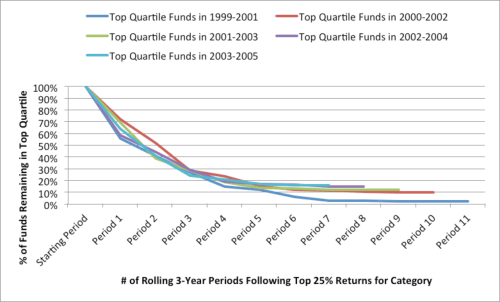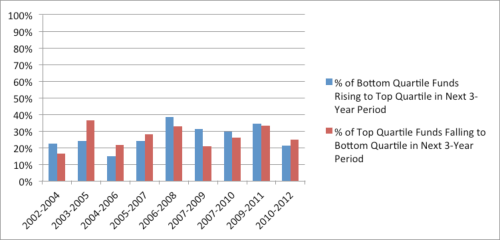When investors are confronted with the vast menu of mutual funds on offer, they face a daunting challenge: how to distinguish between thousands of possible options. Investors must choose from among countless different strategies and fund managers, each with its own spin on the “right” way to manage assets. Moreover, the menu is constantly being reshuffled. Each year new funds enter the marketplace, often with much fanfare, and unsuccessful funds (more quietly) liquidate or merge.
Thus, it is hardly surprising that so many investors are overwhelmed by the choice, and so fall back on easily understood data points that ostensibly separate the vast universe of funds into “good” and “bad” options. In particular, investors tend to heavily weight a fund’s past track record in assessing its performance potential in the years to come. But this begs the question: is a fund’s history any real indication of how it will perform in the future?
How Persistent is Superior Performance?
To answer this question, Gerstein Fisher created a universe of the 930 domestic equity mutual funds from the Morningstar database that had a full 15 years of performance history. We examined the ability of these funds to maintain any significant out- or under-performance over time in their respective categories (e.g., we compared large cap growth funds with the large cap growth universe of funds, and small cap value with small cap value funds).
For our test, we determined which funds, on a rolling three-year basis, placed in the top 25% of returns for their Morningstar categories (for this exercise, we rolled the three-year periods forward by a calendar year each time). While there was some fluctuation over time in terms of how many star fund managers were able to stay on top of their categories, the larger story seems to be how remarkably consistently those high-performers fell out of their top quartiles (see Exhibit 1 below).
Exhibit 1: Persistence of Top Quartile Fund Performance (or Lack Thereof)

Source: Bloomberg, Morningstar, Gerstein Fisher Research
So for example, if an investor were to have picked a fund manager in any of the five years between 2001 and 2005 based on the manager’s trailing three-year performance, she might very reasonably have been drawn to those funds that had placed in the top quartile by beating three out of four peer group competitors.
No matter what year our investor started considering which fund to choose, however, her average experience from that point forward was far from ideal. Within one year there was, on average, a slightly better than 1-in-3 chance that the three-year trailing returns of those same top-tier funds had already caused them to drop out of the top quartile. One year after that, the odds of those funds remaining in the top quartile averaged just 4 in 10. By the third year, nearly 75% of the funds had tumbled from the top quartile. The probability of a fund maintaining its top-quartile ranking continued to decline until by the seventh year after our investor made her decision, there was less than a 1-in-6 chance that the previously top-performing fund was still ranked in the top quartile in its asset class category.
Trading Places
One remarkable result of our study was the high likelihood of top and bottom performers trading places. One might expect that the top 25% of performers, even if they couldn’t maintain the very heights of investment success, would at least avoid the ignominy of falling into the bottom quartile in the following three years. And one might think that, likewise, the bottom quartile would be incapable of easily turning things around and reaching the top quartile. Interestingly, in the rolling 3-year periods between 2002 and 2012, the likelihood that a top performer would descend to the bottom quartile of returns turns out to be exactly the same (27%), on average, as the chance that a “dog” of a fund ends up ascending to the top quartile in the following three years. These results are depicted in Exhibit 2.
Exhibit 2: Best to Worst and Worst to Best

Source: Bloomberg, Morningstar, Gerstein Fisher Research
In short, statistically speaking, an investor would have been just as well off picking a professional manager with an abysmal record of returns as he would have been with a star manager. While there’s obviously more involved in prudently selecting investments to protect and grow your assets than simply flipping a coin or throwing darts at a list of options, past performance, at least by itself, doesn’t seem to have a much better track record than simple chance.
Conclusion
There are many possible explanations for why so few managers are able to consistently outperform their peers. One of the most compelling (in our estimation) is that, in the context of markets that are generally efficient, a vast number of market participants are all seeking to achieve that slight edge over one another. Finding, analyzing, and acting on information unknown to the tens of thousands of other managers actively trading stocks, bonds, and other investments across the world is extraordinarily difficult to do. In the absence of a reliable way to consistently outperform their peers, fund managers have a distinct tendency to revert to the mean--and even those funds with excellent prior performance seem little more likely to continue their outperformance into the future.
Gerstein Fisher firmly believes that investors are best served by identifying a disciplined strategy that is focused on long-term financial goals, rather than chasing after the maximum possible return of tomorrow’s hot fund based on yesterday’s news. (For further analysis of the intricacies of picking a mutual fund, we invite you to read our recent research paper, In Mutual Funds, is Active vs. Passive the Right Question?).
Although many investors lean on data of past performance to select funds for their portfolios, we find that this strategy is suspect given the remarkable lack of persistence in performance of top funds as revealed by our research. Just as the timeworn disclaimer states: past performance is not indicative of future results.
Gregg Fisher, CFA, is Chief Investment Officer of Gerstein Fisher, an independent investment management firm he founded in 1993, and Portfolio Manager of the Gerstein Fisher Funds. Gerstein Fisher, which employs a quantitative, research- based investment approach grounded in economic theory and common sense, manages equity and REIT funds.





